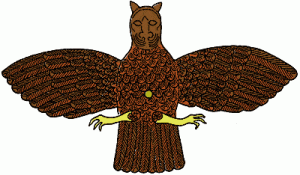The Electronic Text Corpus of Sumerian Literature
(Texts: All Artifacts, Color Coding, & Writings in Bold Type With Italics Inside Parenthesis, are Added by Editor R. Brown, not the Authors, Translators, or Publishers!)
(gods in blue)
Segment A
1-7.The pelican (?) came forth from the holy reedbeds.
It came forth from the holy reedbeds.
The wise pelican (?) spent the day high in the skies.
The pelican (?) cried out in the sky: its singing was sweet and its voice was pleasing.
My lady …… her pelican (?) with beauty.
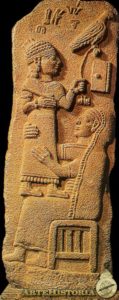 (Nanshe, Enki’s daughter, Goddess of Persian Gulf Birds & Fishes)
(Nanshe, Enki’s daughter, Goddess of Persian Gulf Birds & Fishes)
The mistress, Mother Nanše, …… her pelican (her standard) (?) with beauty.
8-9. “I am the mistress! How can my pelican (?) ……? How can I ……? I am Nanše!
How can my pelican (?) …… holy? How can ……?”
10-22. She herself …… upon the water like a large pelican (?).
Stepping onto earth from heaven, she …… in the water like a holy cow.
A holy pelican (?), a white cow, she drank by the water’s side.
With the towering flood …….
Nanše, shining …… of the Anuna (Anunnaki), the great gods!
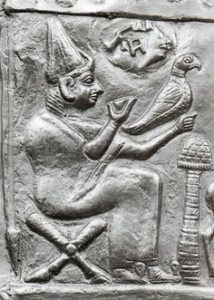 (Enki’s offspring were each given areas of responsibility for Earth Colony establishment)
(Enki’s offspring were each given areas of responsibility for Earth Colony establishment)
Mistress, Mother Nanše, good woman, ……!
Nanše, sister praised by the Anuna (aliens mistaken for gods)!
Mother, beautiful matriarch of Enlil!
{Nanše} {(1 ms. has instead:) My lady}, delighting in her pelican (?),
erected a lapis lazuli shrine, and set the holy pelican (?) by her feet.
23-27. “I am the mistress, so let my birds assemble for me where the sheaves are gathered!
I am Nanše, so let my birds assemble for me where the sheaves are gathered!
Let the birds of heaven and earth stand at my service!
Let every bird without a name bring offerings!
Let every bird not caught in nets ……!”
28-30. The voiceless bat ……, a bird that darts by in the heavens.
The Anzud bird decides the fates with (?) the Anuna gods.
31-42. The sharp-toothed bird in (?) the water sends forth …… wisdom:
“My mistress, ……. I am the bird, the sharp-toothed bird!
All by myself …….
My Nanše, ……!
I am the bird, the sharp-toothed bird!
All by myself …….”
3 lines fragmentary
The lammergeier ……. …… the lammergeier …….
It kills wild bulls in the foothills, and it kills the stags in the high mountains.
43-45. Raven, raven, your eggs are shining bright!
Raven bird, your eggs are shining bright!
Where do people carry off your holy eggs, your …… eggs to?
46-48. The ostrich …… her eggs on the hillside.
She receives those eggs as something to carry: the bird knows how to keep watch at night.
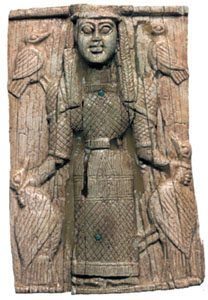 (Nanshe with her birds of the Persian Gulf, ancient Mesopotamia)
(Nanshe with her birds of the Persian Gulf, ancient Mesopotamia)
49-53. The peacock spends the day keeping watch.
The holy bird, the peacock, spends the day calling ‘ḫaya’.
A bird red from cornelian, blue from lapis lazuli, white (?) from chalcedony (?),
with all kinds of gold, and leather inlaid with gold —
may the copper-smith fashion the peacock for you thus.
54-63. O bird in the sky! O vulture, weaver, vulture, weaver!
O uz vulture in the sky!
O vulture, weaver, vulture, weaver!
Its wings together, its feet together,
1 line fragmentary
Its call …… to the ear (?) ……. …… its call …….
4 lines fragmentary
unknown no. of lines missing
Segment B
The misaz bird …… cries out …….
1 line fragmentary
The snake-eater bird is green …….
Its wings …… a barge …….
The …… bird …….
The gubi bird …….
5 lines fragmentary
unknown no. of lines missing
Segment C
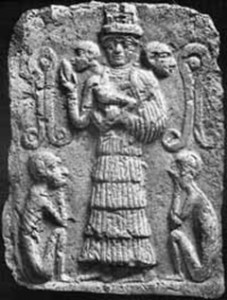 (Ninhursag’s failed attempts at fashioning a worker / “modern man”)
(Ninhursag’s failed attempts at fashioning a worker / “modern man”)
…… of Ninḫursaĝa (Ninhursag) (?) he brings as his property to the mountains.
Since it was searching for its property, the bird is called niĝgurmudum (‘He brings his property’).
The niĝgurmudum bird calls out and laments in the desert of Keš (Kish).
 (Kish ruins & Ninhursag‘s ziggurat residence)
(Kish ruins & Ninhursag‘s ziggurat residence)
7-17. The twittering birds flocking in the palace …….
The salsal bird cries in lament over itself.
The egret (?), seemly in a …… linen garment, is present at the quayside.
The heron (?) is brown, and clad in …… in the reedbeds.
The …… bird catches azagur fish.
The giri-ilu bird, dread of the people, …… its ‘giri-ilu’.
The stork …… picks up (?) …… like grass.
The sa bird names …… its young …….
The dubdubu bird …….
The šegšeg bird sheds tears like a crying baby.
The gubiguzaga bird …… like an angry man.
unknown no. of lines missing
Segment D
(it is possible that Segment D belongs to a different version)
…… green ……. …… birds, like ants in crevices …….
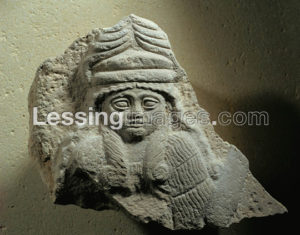 (Bau, King Anu‘s daughter, spouse to her nephew Ninurta, son of Enlil & Ninhursag)
(Bau, King Anu‘s daughter, spouse to her nephew Ninurta, son of Enlil & Ninhursag)
…… Bau (Gula) takes a bath …….
The tigilu bird …… the split roots …….
The dove …… gently in the broad fields.
The pigeon …… bitterly in the vacant lot of the king.
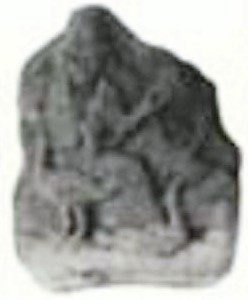 (Nanshe & her birds of the Persian Gulf)
(Nanshe & her birds of the Persian Gulf)
The ubi bird and the udar bird …… ants …….
The bird ……. …… in the gutter like beasts.
1 line unclear
…… humbly like an orphaned child …….
The ḫamun bird …… in harmony …… is dressed in linen.
…… wine, like wine ……
unknown no. of lines missing
Segment E
The girgid bird …….
The dur bird …….
1 line fragmentary
The dar bird …… guard …….
The dar bird …… ‘tikutikumae’.
The …… bird …… in the marshes.
The adardara bird …… the swallow …….
The …… bird, when the net is suspended …….
The …… bird …… marshes …….
The šu-ur bird …… its extended wings and its head.
The sleep bird spends its time crying ‘dilibipila’.
The shepherd bird cries ‘uludig uludig’.
The shepherd bird is brightly coloured like the durdar bird, and has a crest on its head.
The nu-erimla bird does not live in windows or reed huts.
The tirida bird calls the name ‘tirida’ in the reedbeds.
17-20. ……, you are she who loves the fish and birds!
You are she who does not scatter my ……!
You are she who does not belittle ……!
Mistress, Mother Nanše, it is sweet to praise you!
